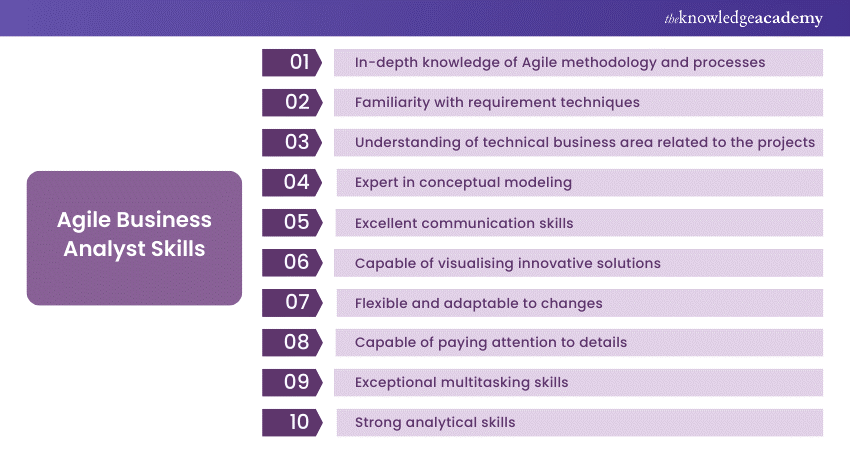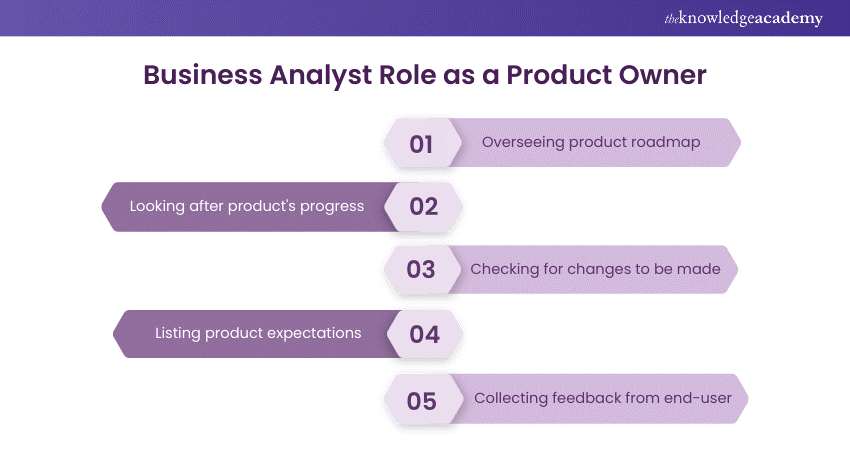We may not have the course you’re looking for. If you enquire or give us a call on 01344203999 and speak to our training experts, we may still be able to help with your training requirements.
Training Outcomes Within Your Budget!
We ensure quality, budget-alignment, and timely delivery by our expert instructors.

Today, organisations implementing an Agile methodology for software delivery prefer to have a Business Analyst (BA) as part of their team. However, the important question is - What is the Business Analyst Role in Agile?
Businesses across various industries are actively seeking Agile Business Analysts. Top-tier companies such as Capgemini, Jaguar, and Lloyds Banking Group have massive openings for the Agile BA job role, according to Glassdoor.
So, if you are searching for a promising career path, familiarise yourself with the Agile Business Analyst Resume. Wondering where to start? Read this blog to explore the Business Analyst Role in Agile methodologies and understand how they contribute to the success of Agile projects.
Table of Contents
1) What is an Agile Business Analyst?
2) What connects Agile Manifesto and a Business Analyst?
3) Tips to transform into an Agile BA from a traditional BA
4) What the key responsibilities of an Agile BA?
5) What is the Role of Business Analyst in Agile?
6) Conclusion
What is an Agile Business Analyst?
An Agile Business Analyst understands the Agile process and assists businesses in implementing Agile concepts. Examine these agile business analyst interview questions. They work with stakeholders, explaining the advantages of Agile and its potential for enhancing business operations. Additionally, they facilitate comprehension among the development team regarding business requirements and how these can be met through Agile methodologies.
The primary objective of an Agile Business Analyst is to address business issues in the organisation. While the rest of the Agile team works on creating functional software components in each iteration or sprint, the Business Analyst is dedicated to the overarching goal of the entire project. Their reduced emphasis on meticulous documentation of project requirements and rules allows them to allocate more time to substantive Business Analysis.
What connects Agile Manifesto and a Business Analyst?
The Agile Manifesto is a document that lists all the fundamental values and principles of the Agile philosophy. It provides Development Teams with guidance on how to work more efficiently and sustainably. The Manifesto comprises four values and 12 principles that help Agile teams adopt an Agile mindset.
These principles guide Business Analysts on how to reflect Agile values. They assist the Agile Teams and Product Owners in thoroughly analysing the business domain and understanding the business processes. BAs provide answers to questions such as:
1) What processes are to be added, deleted, or reworked in a project?
2) Which Stakeholders are essential in the decision-making?
3) What information to derive from a running project to improve in the future?

Tips to transform into an Agile BA from a traditional BA
Today, many organisations are open to hiring professionals for the Business Analyst Role in Agile. However, many prospective job seekers aren’t aware of this amazing job opportunity and cling to the traditional role of a Business Analyst.
If you're interested in becoming an Agile BA, you can avoid this mistake by exploring the roles and responsibilities of a Business Analyst in Agile. Here's a quick guide:
1) Study Agile methodology in detail. You can learn by yourself or can take up a course.
2) Get certified with an Agile Business Analyst certification course.
3) Join Agile training courses and workshops.
4) Start working to build user stories and understand the importance of writing story points.
5) Analyse product performances and learn to take important decisions.
6) Develop crowd-pulling techniques.
7) Develop skills necessary for Business Analyst in Agile Scrum
What the key responsibilities of an Agile BA?
From the beginning of the project to its completion, the role of a Business Analyst in Agile is crucial. Throughout the various stages of the project lifecycle, an Agile BA provides vital inputs to make it more efficient and ensure user satisfaction.
To ensure that the desired objective is achieved, they are required to fulfil certain responsibilities. But what are these responsibilities that make them an important part of Agile Project Management? Here’s a look at the key responsibilities of a Business Analyst in Agile team during various stages of Agile Project Management:
Initial stage
During the initial phases of the project, the Business Analyst Role in Agile BA is to fulfil the following responsibilities:
a) Collecting and listing Stakeholders’ requirements
b) Understanding business needs
c) Facilitating Stakeholder interviews and workshops
d) Collaborating with the Stakeholders to create a Product Backlog and understand priority requirements to complete the project within the timeline
e) Involving in feasibility studies and impact assessments to determine the project’s potential
f) Sorting and stating the requirements in advance for the development team to ease their work
Planning/designing and documentation stage
During the planning and documentation stage of the project, the responsibilities of an Agile Business Analyst include:
a) Preparing a properly structured document with detailed Scrum Sprint plans, goals and Sprint Backlog
b) Assisting Scrum Master during the Scrum meeting to ensure that Stakeholder’s requirements are well understood
c) Working with the team to provide an estimate of efforts and the number of tasks to be done
Gain an in-depth understanding of using PESTLE analysis in a business environment with our Agile Business Analyst Foundation And Practitioner (AgileBA®) Course now!
The development stage
The development phase involves the following Agile Business Analyst responsibilities:
a) Rechecking upon the requirements and providing updates accordingly
b) Helps the Development Team to identify automation areas of the project
c) Working with development teams to understand the scope of user stories, tasks and other technical requirements
d) Deriving information from the Stakeholders’ feedback on developed functions
e) Analysing progress, identifying, and addressing roadblocks during Daily Stand-up meetings
f) Ensuring that the changes made during the development stage are properly documented
Monitoring and delivery stage
During the monitoring and delivery phase as well, the Business Analyst Role in Agile remains essential. The responsibilities include:
a) Using Agile metrics such as burn-down charts, velocity charts, and others to track and report a project’s progress
b) Collaborating with Stakeholders to contemplate the scope for changes in the project requirements
c) Advising teams to identify risks and roadblocks and mitigate them
Review and improvement stage
The final stage of the project lifecycle is the review and improvement. Here the product is testified for the improvements. During this stage as well, the Business Analyst Role in Agile is important. They are responsible for the following:
a) Conducting a project review meeting with Stakeholders and team to reflect upon the performance
b) Completing all the necessary documentation to close the project officially
c) Listing down the lessons learned, methodologies used during the project and recommendations for the future projects
d) Analysing and using the feedback provided at the end of each iteration to improve the next one
e) Checking that the end user’s requirements are met by ensuring that the final product is user-centric
To fulfil each task religiously and appropriately, the Agile BA require to possess various soft and hard skills. Some of them are as follows:

What is the Business Analyst Role in Agile?
Now that you have read how Agile methodology and a Business Analyst are connected, it is time to understand the Business Analyst Role and Responsibilities in Agile lifecycle. The following are Business Analyst Roles in Agile:
As an Advisor
In an Agile environment, the final decision falls in the hand of the Product Owner. They are also responsible for setting the product vision and understanding the business needs of the Stakeholders.
Although, the Agile Business Analyst does not have the ultimate decision-making power. However, the Agile BA play a crucial role in the Agile team by:
a) Advising and assisting the Product Owner in analysing the business domain
b) Stocking Product Backlog by listing user stories aligning with the project’s scope
c) Grooming the Product Backlog by adding approval criteria, reducing redundancies, and filtering user stories
As a communicator
The Business Analyst Role in Agile also involves being a communicator for the Agile Team. During the Agile Processes, they communicate with the team as Analytics Specialists to promote collaboration, present examples, and transfer knowledge.
a) An Agile BA is aware of the Stakeholders’ requirements and which Stakeholders are actively present, and who has the appropriate data about a specific topic. Therefore, they become a communication medium between team members and Stakeholders, thus promoting collaboration.
b) Presenting examples of the various aspects of the project lifecycle is a great way to remember the information discussed during meetings. It includes information such as how to find the right way to deliver user stories and much more.
c) Agile BA possesses all the necessary information from the Product Owner’s and Stakeholder’s point of view. They are also aware of the dilemmas of the team members. Therefore, they can pass on the appropriate information to the team members and vice-versa.
Learn how to understand Stakeholder perspectives to provide potential solutions. Register for our BCS Certificate In Business Analysis Practice Course now!
As a member of the Scrum team
Another Business Analyst Role in Agile is to be a part of the Scrum Team. As a member of the Scrum team, they are responsible for the following:
a) Ensuring that the team clearly and precisely understands the Stakeholder’s requirements
b) Working with the team to keep the backlog updated and reflect the team’s understanding of the requirements
c) Discussing and finding backlog items, defining requirements, and giving input on the product’s technical potential during sprint planning
d) Reviewing sprint results and providing feedback for further developments
As a story writer
The Agile Business Analyst plays the role of a story writer. In simple terms, they are primarily responsible for listing user stories and acceptance criteria. This makes it easy for Stakeholders, the Product Owner and the team to clearly understand the project requirements. Writing user stories also provides knowledge of the project’s standards and limitations.
As a Product Owner

Lets compare agile business analyst vs product owner, Agile BA assists the Product Owner during the decision-making, they often act as a Product Owner. They look after everything related to the product roadmap, progress, and changes. They also communicate with the end-users to list product expectations and take feedback on the completion.
Role of a Business Analyst as a business coach
An Agile Business Analyst plays a crucial role in helping businesses to utilise Agile methodology to attain their desired results. It involves collaborating with organisations to make them understand their aims and objectives. This is followed by giving recommendations on the most effective implementation of Agile practices to realise these goals.
An Agile Business Analyst needs to have a clear idea of the Agile methodology and a thorough understanding of the business they are providing guidance to. It is essential for them to communicate adeptly with both business stakeholders and Agile delivery teams. This ensures that everyone is in sync and collaboratively striving towards a shared objective. They play a pivotal role within an Agile delivery team, and their contribution is vital to the success of an Agile transformation.
Skills required to be an Agile Business Analyst
An Agile BA ensures that the product aligns effectively with genuine business requirements and seamlessly integrates into the existing business perspective. The essential skills needed to achieve this include the following:
Good communication skills
An Agile Business Analyst is required to engage with a diverse range of individuals, considering everyone's needs and concerns. Also, they must establish a common understanding of the product vision and requirements. Accomplishing these tasks demands proficient Communication Skills to negotiate and influence both the team and stakeholders.
In-depth business knowledge
Being the go-to person for both the team and stakeholders, an Agile BA must possess a comprehensive comprehension of the business, product, and vision. Alongside extensive business and product expertise, they should also demonstrate the ability to identify and prioritise business value.
Knowledge of different tools and techniques
The effectiveness of a team in Agile is enhanced by utilising Agile tools and techniques. These tools facilitate the below-mentioned functions among other functions:
a) Management of backlogs
b) Enable real-time collaboration
c) Generate estimates
d) Produce reports for sprints and releases
A fundamental understanding of the diverse tools and techniques applicable to Agile is an essential skill for an aspiring Agile BA.
Anticipation
The basic definition of an Agile BA includes the element of anticipation. When Agile BA possess thorough knowledge about the product and its diverse facets, they can anticipate outcomes effortlessly. Nevertheless, they must make decisions judiciously without adversely affecting the overall organisation.
Agile Business Analyst salary overview
According to Glassdoor, typical Agile Business Analyst earns £60,926 per year. Location, experience, industry, and skills play an important role in determining an Agile Business Analyst's salary. Financial services, IT & Software, and consulting are the top three industries for Agile Business Analysts in the UK, offering salaries of £70,000, £65,000, and £62,000 respectively.
Listed below are salaries based on number of years of experience:
a) Entry-level (1-2 years experience): They can expect a salary range between £30,000 to £45,000 per year.
b) Mid-level (3-5 years experience): Salary range typically falls between £45,000 and £60,000 per year.
c) Senior-level (5+ years experience): Command higher salaries, ranging from £60,000 to £85,000 annually.
d) Executive-level (10+ years experience): They can expect salaries exceeding £100,000 per year.
Conclusion
The Business Analyst Role in Agile is crucial. They act as an advisor, coach, team member, story writer, and oversee and participate in all the decision-making activities. Keeping the importance of Business Analysts in mind, modern industries are extensively hiring these professionals to improve the efficiency of projects.
Learn how to analyse and improve agile projects successfully. Register for our Agile Business Analysis Training course now!
Frequently Asked Questions

No, a Business Analyst is not inherently a Product Owner in Agile. While both roles contribute to product development, they have distinct focuses. A Business Analyst concentrates on understanding business needs, analysing processes, and facilitating communication between stakeholders and the development team.
On the other hand, a Product Owner is responsible for defining and prioritising features, representing the customer's perspective, and making decisions on behalf of the business. While there can be overlap, especially in smaller teams, the roles serve different purposes, each crucial for successful Agile implementation.

In Scrum, a Business Analyst collaborates closely with the Scrum Master to ensure effective communication between the development team and stakeholders. The Business Analyst facilitates the understanding of business requirements, refines user stories, and ensures alignment with project goals.

The primary role of a Business Analyst is to bridge the gap between business needs and technological solutions. They analyse processes, gather and document requirements, and collaborate with stakeholders to ensure alignment between business goals and IT capabilities.

The Knowledge Academy takes global learning to new heights, offering over 30,000 online courses across 490+ locations in 220 countries. This expansive reach ensures accessibility and convenience for learners worldwide.
Alongside our diverse Online Course Catalogue, encompassing 17 major categories, we go the extra mile by providing a plethora of free educational Online Resources like News updates, Blogs, videos, webinars, and interview questions. Tailoring learning experiences further, professionals can maximise value with customisable Course Bundles of TKA.

Explore Agile Courses with The Knowledge Academy, where more courses await, including Agile for Teams, Agile Overview, and Agile Change Agent. Tailored for various skill levels, these courses offer in-depth insights into Agile methodologies.
Dive into our Project Management blogs, a trove of resources covering Agile topics. Whether you are a beginner or aiming to enhance your Project Management skills, The Knowledge Academy's diverse courses and insightful blogs are your go-to source.
Upcoming Business Analysis Resources Batches & Dates
Date
 Agile Business Analyst Foundation and Practitioner (AgileBA®)
Agile Business Analyst Foundation and Practitioner (AgileBA®)
Mon 20th May 2024
Mon 1st Jul 2024
Mon 19th Aug 2024
Mon 14th Oct 2024
Mon 11th Nov 2024
Mon 9th Dec 2024







 Top Rated Course
Top Rated Course


 If you wish to make any changes to your course, please
If you wish to make any changes to your course, please


